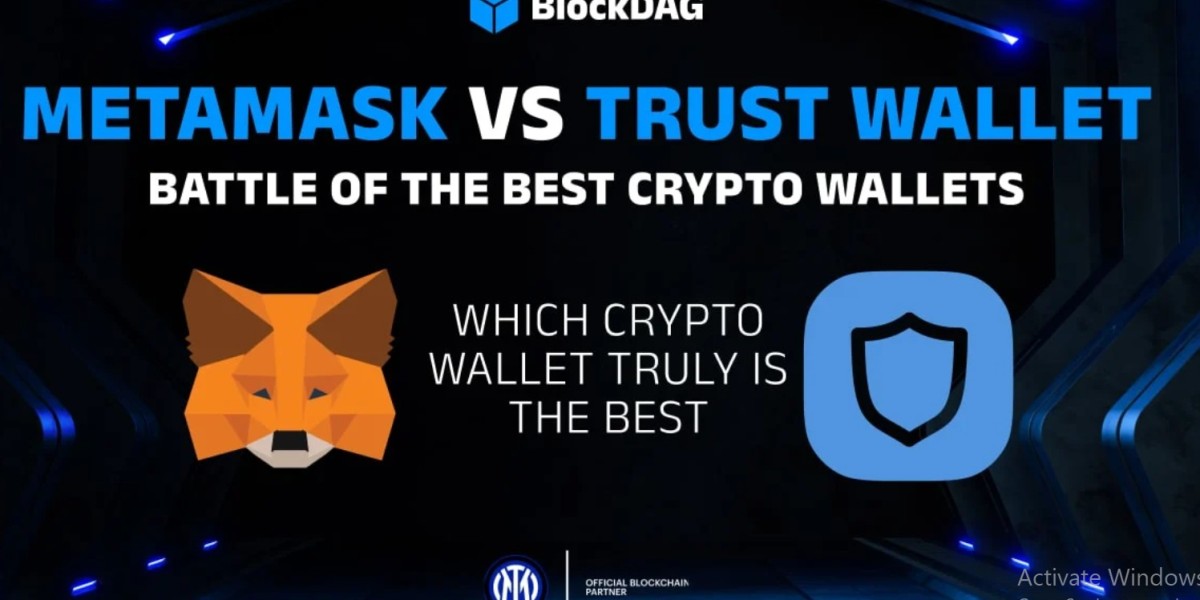1. Introduction
As the crypto market continues to gain popularity, non-custodial wallets have become essential tools for users who want control over their digital assets. Among the top options, MetaMask and Trust Wallet stand out as the most secure and widely used wallets globally. Each has millions of users who rely on these platforms for sending, receiving, and storing cryptocurrencies. But which one is the better choice? In this blog, we’ll compare metamask vs trust wallet across key categories like blockchain compatibility, token swapping, NFT support, dApp interaction, staking capabilities, and more.
2. MetaMask Vs Trust Wallet: Overview of Key Differences
MetaMask and Trust Wallet share several similarities—they’re both free to use, non-custodial, support crypto staking, DeFi integration, and dApp usage. However, the key differences arise in the user experience, supported networks, transaction flexibility, and more. Understanding these distinctions can help users choose the wallet that best suits their crypto needs.
3. Blockchain Compatibility
MetaMask started as an Ethereum-only wallet but has expanded to support EVM-compatible networks like Binance Smart Chain and Polygon. However, users must manually configure these networks, which might pose a challenge for beginners.
Trust Wallet, on the other hand, supports a wider variety of blockchains right out of the box, including Ethereum, Binance Chain, Solana, and many Layer-1 protocols. For users seeking effortless multi-chain support, Trust Wallet takes the lead.
4. Token Swapping Capabilities
Both wallets have integrated token-swapping features.
MetaMask primarily supports Ethereum-based tokens and offers swap features directly in the app, relying on aggregators to find the best price.
Trust Wallet has broader support, offering token swaps not only for Ethereum but also for Binance Smart Chain and other networks. Its flexibility gives it a slight edge in this category.
5. NFT Management
NFTs have become a big part of the crypto space, and wallet support is essential.
MetaMask supports Ethereum-based NFTs but falls short when it comes to user experience, especially with assets on non-Ethereum chains.
Trust Wallet provides a more streamlined NFT experience across multiple networks, making it a more favorable option for NFT collectors who want to manage assets on chains beyond Ethereum.
6. dApp Browsing and Web3 Access
MetaMask shines when it comes to interacting with Web3 applications. Its browser extension allows smooth access to DApps from a desktop, offering better performance and deeper integration for Ethereum-based DeFi tools.
Trust Wallet also supports dApps via its mobile app and recently introduced a desktop extension, aiming to offer a comparable experience. However, desktop users may still find MetaMask more convenient and robust for Web3 engagement.
7. Staking Support
Both wallets provide staking opportunities, but with different strengths.
Trust Wallet allows in-app staking for a variety of coins like BNB, Tezos (XTZ), and more. This feature helps users earn passive income directly from the app.
MetaMask also supports staking but focuses more on Ethereum-based staking options, including validator staking and liquid staking. While it is catching up, Trust Wallet offers broader staking support at the moment.
8. Security Comparison
Security is a top priority for both wallets. Being non-custodial, both MetaMask and Trust Wallet allow users full control over their private keys. Their open-source nature also invites community auditing and transparency.
However, both platforms are vulnerable to phishing attacks and user error, emphasizing the need for users to follow best security practices like double-checking URLs and storing recovery phrases offline.
9. User Experience and Accessibility
MetaMask is known for its sleek user interface but can be intimidating for new users due to manual network configurations. That said, it has an abundance of guides and community support to assist users.
Trust Wallet offers a smoother and more beginner-friendly experience. With built-in support for multiple chains and easy-to-use mobile functionality, it is ideal for users who prioritize convenience and simplicity.
10. Transaction and Network Fees
Both wallets dynamically calculate network fees based on blockchain congestion and offer built-in swap functions that carry small fees.
There is no significant difference in transaction costs between MetaMask and Trust Wallet, as these are generally determined by the blockchains themselves rather than the wallets.
11. Final Verdict: Which Wallet Is Best for You?
Your choice between MetaMask and Trust Wallet ultimately depends on your individual needs and preferences:
Choose MetaMask if you're heavily involved in Ethereum or its DeFi ecosystem and prefer using Web3 apps from your desktop browser. It's excellent for developers, traders, and users focused on dApps and EVM-compatible platforms.
Choose Trust Wallet if you're looking for a simple, mobile-first experience that supports multiple blockchains and NFTs. Its built-in staking and multi-chain compatibility make it a versatile option for beginners and casual crypto users.
12. Beyond Wallets: BlockDAG – A New Era of Blockchain Innovation
While wallets like MetaMask and Trust Wallet are essential tools for crypto management, the crypto world is evolving rapidly. A standout innovation gaining traction is BlockDAG, an advanced combination of blockchain and Directed Acyclic Graph (DAG) technologies. BlockDAG’s hybrid model is optimized for scalability, speed, and security—addressing some limitations of traditional blockchain systems.
BlockDAG has raised over $216 million in its ongoing presale, attracting significant attention from institutional and retail investors alike. With its 27th Batch priced at $0.0248 and over 19.3 billion tokens sold, BlockDAG is showing robust momentum.
For those interested in crypto mining, BlockDAG offers two efficient devices:
X10 Miner: A compact device capable of producing up to 200 BDAG per day
X100 Miner: A high-powered ASIC machine that can yield up to 2,000 BDAG daily
Over 15,850 units have already been sold, showing that a vibrant mining community is forming around the project. To make mining more accessible, BlockDAG also provides a mining calculator, helping users estimate profits based on energy consumption and hashrate.
Moreover, BlockDAG’s Ambassador Program encourages community engagement through promotional efforts, educational initiatives, and global outreach. Strategic partnerships with industry leaders have further validated BlockDAG's credibility.
13. Conclusion
MetaMask and Trust Wallet both offer secure, powerful features for managing cryptocurrencies, staking, and interacting with DeFi and NFTs. They cater to different audiences—desktop-focused Ethereum users vs. mobile-first multi-chain users. While each has its merits, the future of blockchain goes beyond wallets. With the emergence of innovations like BlockDAG, the crypto space is stepping into a more scalable and decentralized future. Whether you're choosing a wallet or looking for the next investment opportunity, staying informed and adaptive is key in this fast-paced ecosystem.





